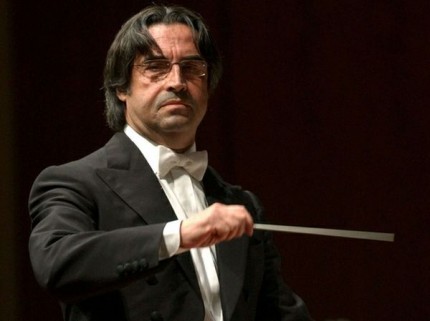Glorious Strauss and world premiere highlight Muti’s return

In the penultimate week of his inaugural season as music director, Riccardo Muti led a program Thursday night that showcased his bona fides in both new music and traditional Romantic repertory.
The main point of interest was the world premiere of Danza Petrificada by Bernard Rands. The CSO commission was rescheduled from last October due to Muti’s illness and interrupted fall residency.
Composed at Muti’s request to mark the centennial and bicentennial of Mexico’s independence and revolution, Danza Petrificada takes its title from a stanza of Octavio Paz: “. . . a banquet of forms, a petrified dance under the clouds that make and unmake and never stop making themselves always in transit toward their future forms.”
To his credit, the English-born American composer avoids the usual Mexican dance rhythms and tourist-trap musical tropes. Yes, Danza Petrificada calls for a large percussion battery for four players and opens with a rustle of maracas and muted trumpet. But Rands’ piece is more edgy and impressionistic than sunny homage, a moody tone poem with passing Mexican elements, glimpsed as if through a refracted lens.
Danza Petrificada is that rare work that manages to be both intelligent and individual, while also serving its functional purpose as a lively, audience-friendly, nine-minute curtain-raiser—even with the abrupt coda.
Rands was composer in residence at the Philadelphia Orchestra during part of Muti’s tenure there and the conductor clearly has a feel for his musical sensibility, drawing a vital and crackling performance from the CSO musicians.
Richard Strauss is a composer that Muti has conducted selectively over his career. Yet based on the quite glorious performance of Tod und Verklarung (Death and Transfiguration) Thursday night, this is repertoire that the Italian maestro should explore more fully—-especially since he’s now leading one of the world’s great Strauss orchestras.
The German composer’s restless, mercurial Romanticism fits Muti’s musical temperament like a well-tailored glove. The widely terraced palette was manifest from the start with the violas’ barely audible opening statement. This atmospheric, highly concentrated performance conveyed all of the richness of Strauss’s score—the dying man’s faltering heartbeat, the spirited memories of impassioned youth, the gentle rendering of the rising theme’s first appearance. The mystery and post-mortem closing section was especially inspired, and throughout Muti and the CSO brought sweep, extraordinary sensitivity and apt luminosity to this remarkable score.
Prokofiev’s Romeo and Juliet has long been a Muti favorite, the conductor having recorded a celebrated disc of the first two suites during his tenure with the Philadelphia Orchestra.
The generous 48-minute selection of excerpts from Prokofiev’s ballet performed Thursday offered most of that music, reshuffled to form a chronological narrative of the tragic love story.
This brand of high-contrast orchestral showpiece is prime meat for the CSO’s music director, and the dramatic weight, dynamic detailing and organic flow Muti and the orchestra brought to the work presented Prokofiev’s ballet as a kind of large-scale dramatic symphony.
From the malign chordal blast of Montagues and Capulets, it was clear that this would be a big-boned, very Russian take on Prokofiev’s ballet. Muti brought out the sardonic element of Masks beneath the ballroom elegance and drew playing of violent intensity and dramatic heft in The Death of Tybalt, particularly in the concluding off-kilter cortege.
One can quibble that the clear-eyed straightforward take on Juliet as a Young Girl was light on charm, but there were moments of great delicacy as well—the glowing tenderness of the string playing in Romeo and Juliet, the warmth of the violas and cellos in Friar Laurence and the majestic horns and tick-tock woodwinds in Romeo and Juliet Before Parting.
The orchestra was at their finest as a collective and individually with particularly evocative flute solos by Mathieu Dufour.
The program will be repeated 8 p.m. Friday and Saturday and 7:30 p.m Tuesday. At Tuesday’s concert Hindemith’s Symphony in E flat will replace the Prokofiev. cso.org; 312-294-3000.
Posted in Uncategorized




